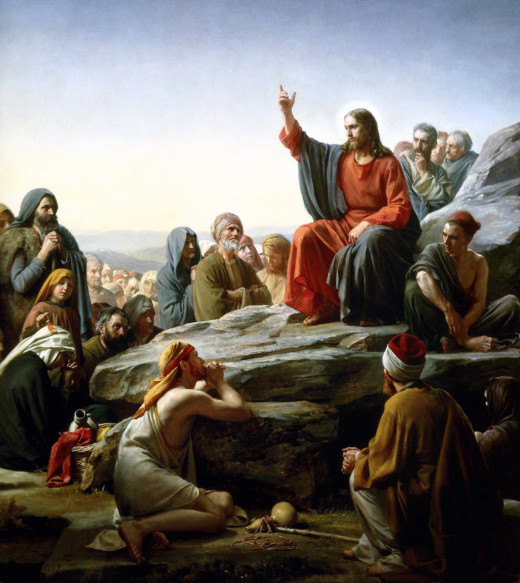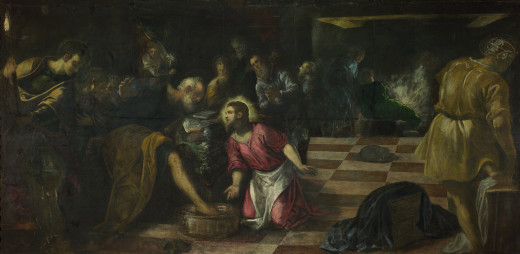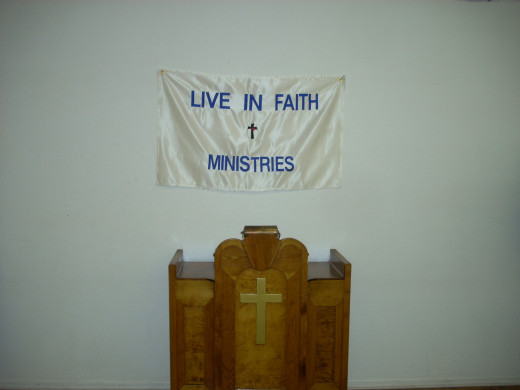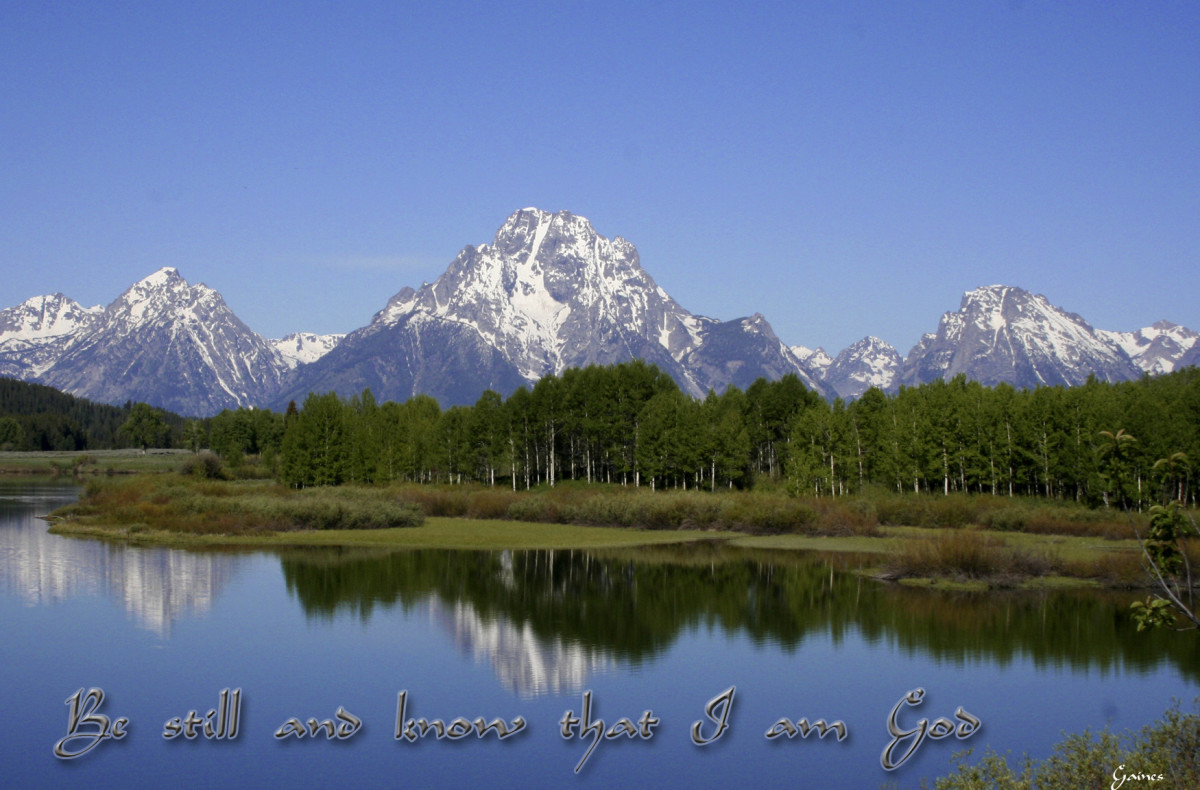Called to Be Blessed
Memory Verse
Matthew 16:24 Then Jesus told his disciples, "If anyone would come after me, let him deny himself and take up his cross and follow me.

Two Authors – Two Viewpoints
There are two different in-depth accounts of this sermon. The first is shown in Matthew. Now the author of Matthew is the tax collector that followed Jesus. The main purpose of his writing was to prove to his Jewish readers that Jesus was their Messiah. The second record of the Sermon on the Mount is found in the Gospel of Luke. Luke was an educated Greek who wrote specifically for the Gentiles to show that Jesus loved all people. Most people are familiar with the version written in Matthew because it is the first book of the New Testament.
A Man Humbles Himself Before All Men
Before diving into Jesus’ sermon, lets look at what happens just prior. In Lukes’ version we see a man who comes down to the crowds level…. Luk 6:17 And he came down with them and stood on a level place,” In Matthews account we read, “Seeing the crowds, he went up on the mountain, and when he sat down, his disciples came to him.
Mat 5:2 And he opened his mouth and taught them, “
Jesus brought himself to the level of the disciples and the crowd before beginning His sermon. Why? Maybe it was to be more personable or, as I believe, He brought Himself down to the level of the people He was about to speak . Although Jesus taught with authority, He also met the people where they were at in life. Jesus chose to sit before the crowds in a humble state and spoke simply so that everyone could understand.

The Beatitudes
We know the teachings of Jesus that follows as the “Beatitudes”—from the Latin word for “happiness”— or as I felt, too long to memorize. Upon further review, however, the Beatitudes should be easy to memorize precisely because of the common thread that runs through each of them—humility—and because of the astonishing fact that the one man who could have afforded to be full of himself, was not. Here, a man who has healed many, fed thousands and spoke with authority, sat down among the crowd to teach them.
Mat 5:3-12 "Blessed are the poor in spirit, for theirs is the kingdom of heaven. "Blessed are those who mourn, for they shall be comforted. "Blessed are the meek, for they shall inherit the earth. "Blessed are those who hunger and thirst for righteousness, for they shall be satisfied. "Blessed are the merciful, for they shall receive mercy. "Blessed are the pure in heart, for they shall see God. "Blessed are the peacemakers, for they shall be called sons of God. "Blessed are those who are persecuted for righteousness' sake, for theirs is the kingdom of heaven. "Blessed are you when others revile you and persecute you and utter all kinds of evil against you falsely on my account. Rejoice and be glad, for your reward is great in heaven, for so they persecuted the prophets who were before you.

True Humility
When people hear the word humility, they often mistake it for the negative tense of the word. Humility is often associated with “being ashamed”. However, the shame or degradation comes from the word humiliation. The common thread of humility in the Beatitudes is shown as a positive sense of being. Being humbled to know that there is something greater than ourselves. God in essence says through the Beatitudes that a spirit of humility is more special, and certainly lasts longer, than gold.
To better understand why Jesus would think like this, let’s go back to the previous chapter. This is where we find a very human Jesus, a Jesus “led by the Spirit into the wilderness to be tempted by the devil” (Matthew 4:1). We find in this narrative, the Jesus who is “tempted.” We are prone to think that humans are tempted—not God! The tempter, the devil, proceeded to tempt Jesus three times. Each time Jesus refused, quoting Scripture. Finally, Jesus says to him in Mat 4:10 "Be gone, Satan! For it is written, "'You shall worship the Lord your God and him only shall you serve.'" And Satan left and the angels came to minister to Him.
A couple of points I would like to make before getting back to The Beatitudes and the humble spirit. First, we must always remember that Jesus’ temptation took place immediately after His baptism. So it lays at the foundation of His ministry. First the outpouring of the good Spirit, and then the assaultings of the evil one. First action of grace, and then an action of discipline. The grace is a free gift, the discipline will take time. Secondly, the temptation of Christ in the wilderness represents the great law of the history of man’s nature—that every one of us must, in order to realize our true work and moral position in this world, meet and contend with the powers of evil. Christ is the King by victory of all the warrior-host of God. No truths can be dearer to a human heart than these two—the sympathy of the Son of man in temptation; the victory of humanity in the Son of man over evil.
Down throughout the centuries, the church has proclaimed Jesus to be “fully human and fully God.” Yet for Christians striving for true growth, it is just as important to say that Jesus was the only human to endure all temptation and emerge sinless, Jesus is the sole human to be “fully man”.
This was why the crux of the work of the medieval saint Anselm was important among the early Reformers, including Martin Luther and John Calvin, and played an especially crucial role in the work of John Wesley. Their point: all of us are called to become fully human. It was universally and paradoxically acknowledged, at least until Wesley, that all of us share this commonality, but that none of us are there yet. Since the fall of humankind, we are less than fully human, less than what we were created to be.
Our True Purpose
The Sermon on the Mount, however, gives us the answer that brings us back to discovering our true purpose and reason for being and in essence finding our humanity. While we live in the twenty-first century and talk about reason, the ability to reflect upon our own existence, using human rights as indicators of the differences between people and the other parts of creation, Jesus goes in a decidedly different direction. While our society is a bankrupt economy and people are measured by what they do or do not have, Jesus tells us that in order for people to be what they were created to be, their focus should not be upon the self but upon developing the strength and security to be vulnerable to God and to other persons. Therefore the “blessed”—those living in an already realized state of joy—are the poor in spirit, the mourners, the meek, the merciful, the pure in heart, the peacemakers, and the persecuted. In otherwords, the humble in spirit.
The question that arises, however, is similar to questions about the Ten Commandments. Do we have to? Is this a requirement, Jesus?” After all, Jesus, fully God and fully human, didn’t use the word saved here. He doesn’t say, “You must be meek, you must be a peacemaker.” Jesus uses the word blessed here; the common usage of this word in Jesus’ day conveyed a sense of joy.
For those of us who consider adherence to this section of the Sermon on the Mount optional—just as many have called the remaining Sermon’s strict admonitions against anger, lust, and other evil desires impossible—a simple reading of different sections of Matthew will give you an answer to an easy out. In chapter 16, for example, we find that humility is not one of many ways to God, but the only posture of a follower of Jesus. Here Jesus addresses his disciples, telling them that he will soon die, that he will suffer and die in the hands of the religious elite in Jerusalem, but that the community of faith will live on. There is one requirement for membership in this church, however, Jesus tells the disciples: “Mat 16:24 Then Jesus told his disciples, "If anyone would come after me, let him deny himself and take up his cross and follow me.”
From the day of his temptation, when He refused to prove Himself by doing any work to support Himself, or to make His power manifest, or to take possession of His kingdom—from that day forward to His death, He was practicing self-denial, and so was revealing God the Father to men. The cross was the gathering up of all that previous sacrifice. And having proved this to be the true life of man, the law of human life, He called upon men to enter into it with Him. Self-denial was not to be an occasional act; it is the ground of man’s existence, for it is the ground of His.
There are other Scripture that reveal the value of being humble. A few that come to mind are:
Psa 25:9 He leads the humble in what is right, and teaches the humble his way.
Pro 3:34 Toward the scorners he is scornful, but to the humble he gives favor.
Pro 11:2 When pride comes, then comes disgrace, but with the humble is wisdom.
James 4:6 But he gives more grace. Therefore it says, "God opposes the proud, but gives grace to the humble."
1Pe 3:8 Finally, all of you, have unity of mind, sympathy, brotherly love, a tender heart, and a humble mind.

Humbleness Personified
There is one more example of humbleness that comes to mind that Jesus demonstrated shortly after the Lords’ Supper
Joh 13:1 Now before the Feast of the Passover, when Jesus knew that his hour had come to depart out of this world to the Father, having loved his own who were in the world, he loved them to the end. During supper, when the devil had already put it into the heart of Judas Iscariot, Simon's son, to betray him, Jesus, knowing that the Father had given all things into his hands, and that he had come from God and was going back to God, rose from supper. He laid aside his outer garments, and taking a towel, tied it around his waist. Then he poured water into a basin and began to wash the disciples' feet and to wipe them with the towel that was wrapped around him. He came to Simon Peter, who said to him, "Lord, do you wash my feet?" Jesus answered him, "What I am doing you do not understand now, but afterward you will understand."
This example goes further than just the humble act. There is more to this Scripture that we will look at in the coming weeks. Lets’ look a little deeper into the humbleness Jesus showed here. He put aside His outer garments and girded Himself around the waist with a towel. This is how a servant would prepare to wash His masters feet. Jesus Himself demonstrated true humility when He washed the disciples feet. In those times, everyone wore sandals. The slaves would wash their masters feet to cleanse the dirt. However, once again, Jesus turned all that around.
Growing In Christ
Being a follower of Jesus is not easy. It is not something that will take away bad habits from you overnight. Growth is change. Growth is sometimes painful. The Jesus we encounter at the Sermon on the Mount is already telling us that the way to the blessed or joyful life is to turn the values of this world upside-down. While the world tells us to make sure that our self-esteem balloon is fully inflated, Jesus calls us to be poor in spirit and meek or gentle. While the demands of our lives and of the economy may command us to get on with life after a loved one’s death, Jesus calls us to take time to mourn. In a warring world where the ability to kill quickly and precisely is valued by nations, Jesus calls us to be peacemakers. Easy? No. Required of Jesus’ followers and therefore of persons who desire to be like Jesus, to be truly human? Yes. We are called to be blessed.
It is at the foot of the Cross humility is born; that Divine flower, hitherto unknown by the world, came out of the earth moistened by the blood of Christ.










